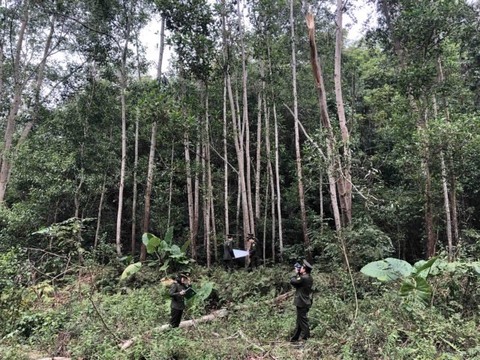
The forestry sector targets the export value of timber and forest products to reach US$14 billion in 2021. — VNA/VNS Photo
The forestry sector targets the export value of timber and forest products to reach US$14 billion in 2021, according to the Viet Nam Administration of Forestry.
This sector will also develop and effectively use the existing forest area to improve the output, quality and value of products, Nguyen Quoc Tri, administration director said at a conference on performance in 2020 and implementation of key tasks in 2021 held on Wednesday in Ha Noi.
Speaking at the conference, Minister of Agriculture and Rural Development Nguyen Xuan Cuong said the sector has developed processing activities of wood and furniture products but still had too many raw products. There are few high-value handicraft products and pieces of furniture. Especially, wood processing companies are mainly located in the southern region.
Therefore, the minister has requested the sector to focus on development of the forestry economy and production growth of 10 per cent each year in the period from 2021 to 2025 and beyond.
Cuong also said the forestry sector is facing many difficulties, including fiercer global trade competition. South Korea and the US, two key furniture export markets of Viet Nam, have started tax investigations against Vietnamese furniture exports, so it needs to speed up reforestation to supply timber with origin for exports and processing.
The forestry sector also needs to increase the forest coverage rate. The rate now is 42 per cent but the sector must pay attention to forest development in the three key areas of the Northwest, Central Highlands, and coastal region, he said.
Besides that, the policy on forest protection and development is inadequate and it has not encouraged local people to participate in forest protection and development.
In 2020, the sector’s production, processing and consumption of wood and forest products were affected by the COVID-19 pandemic, causing breaks in the global supply chain, according to Cuong.
The pandemic has also had a negative impact on 6,000 enterprises in the forest production industry, especially over 1,600 enterprises processing and exporting forest products. Some of them had to close.
In addition, logistics activities faced many difficulties due to the lack of containers, causing a higher freight rate.
With those situations, the administration coordinated with those enterprises and associations to solve difficulties. They guided businesses to handle international trade disputes and helped businesses reduce difficulties and resume production to maintain the industry’s production growth.
As a result, the industry gained a year-on-year growth of 16.4 per cent in the export value of timber and wooden products to $13.17 billion in 2020, accounting for 31 per cent of the agriculture sector’s total export value. — VNS